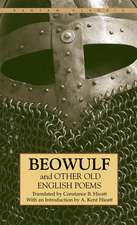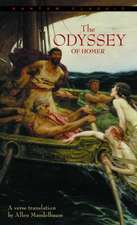The Aeneid of Virgil
Autor Virgil.en Limba Engleză Paperback – 9 mai 2007
Virgil was recognized during his lifetime as being the greatest poet of his age, and the most striking figure in the brilliant circle of literary men centered about the court of the Emperor Augustus. He seems to have been a man of simple, pure, and loveable character, and the references to him in the works of Horace clearly show the affection with which he was regarded by his friends.
Although Virgil turned to the Greek epics for the general framework and many of the details of his epic poem, The Aeneid, he always remained master of his materials, and stamped them with the impress of his own genius. The spirit which inspired the Aeneid was wholly Roman, and the deep faith in the National Destiny, and stern sense of duty to which it gave expression, its profoundly religious character and stately and melodious verse, have always caused it to be recognized as the loftiest expression of the dignity and greatness of Rome at her best.
But, the sympathetic reader will be conscious of a deeper and more abiding charm in the poetry of Virgil. Even in his most splendid passages his verses have the quality to thrill us with a strange pathos with his sensitiveness to unseen things - things beautiful and sad - giving utterance as the voice of Nature herself, to that pain and weariness, yet hope of better things, which is the experience of her children in every age.
| Toate formatele și edițiile | Preț | Express |
|---|---|---|
| Paperback (8) | 41.84 lei 3-5 săpt. | |
| Bantam Classics – 31 aug 1981 | 41.84 lei 3-5 săpt. | |
| CreateSpace Independent Publishing Platform – | 53.09 lei 3-5 săpt. | |
| Mint Editions – mai 2021 | 63.27 lei 3-5 săpt. | |
| El Paso Norte Press – 9 mai 2007 | 128.03 lei 3-5 săpt. | |
| – | 140.26 lei 3-5 săpt. | |
| Lector House – 20 mai 2019 | 88.53 lei 6-8 săpt. | |
| Theophania Publishing – | 171.30 lei 6-8 săpt. | |
| TREDITION CLASSICS – 29 feb 2012 | 187.31 lei 6-8 săpt. | |
| Hardback (1) | 115.97 lei 3-5 săpt. | |
| Mint Editions – 21 mai 2021 | 115.97 lei 3-5 săpt. |
Preț: 128.03 lei
Nou
Puncte Express: 192
Preț estimativ în valută:
24.50€ • 25.65$ • 20.27£
24.50€ • 25.65$ • 20.27£
Carte disponibilă
Livrare economică 15-29 martie
Preluare comenzi: 021 569.72.76
Specificații
ISBN-13: 9781934255100
ISBN-10: 1934255106
Pagini: 360
Dimensiuni: 152 x 229 x 20 mm
Greutate: 0.53 kg
Editura: El Paso Norte Press
ISBN-10: 1934255106
Pagini: 360
Dimensiuni: 152 x 229 x 20 mm
Greutate: 0.53 kg
Editura: El Paso Norte Press
Notă biografică
Publius Vergilius Maro, known to us as Virgil (70 B.C.-19 B.C.), is best remembered for his masterpiece, The Aeneid, in which he represented the Emperor Augustus as a descendant of the half-divine Aeneas, a refugee from the fall of Troy and legendary founder of Rome. Virgil claimed on his deathbed that The Aeneid was unfinished and expressed a desire to have it burned, but it became the national epic of ancient Rome, a monument of Latin literature, and has been regarded as one of the great classics of Western literature ever since. Virgil's other works include the Eclogues and the Georgics, also considered masterpieces.
Extras
Book I
I sing of arms and of a man: his fate had made him fugitive; he was the first
to journey from the coasts of Troy as far
as Italy and the Lavinian shores.
Across the lands and waters he was battered 5
beneath the violence of High Ones, for
the savage Juno's unforgetting anger;
and many sufferings were his in war-
until he brought a city into being
and carried in his gods to Latium; 10
from this have come the Latin race, the lords
of Alba, and the ramparts of high Rome.
Tell me the reason, Muse: what was the wound
to her divinity, so hurting her
that she, the queen of gods, compelled a man 15
remarkable for goodness to endure
so many crises, meet so many trials?
Can such resentment hold the minds of gods?
There was an ancient city they called Carthage-
a colony of refugees from Tyre- 20
a city facing Italy, but far
away from Tiber's mouth: extremely rich
and, when it came to waging war, most fierce.
This land was Juno's favorite-it is said-
more dear than her own Samos; here she kept 25
her chariot and armor; even then
the goddess had this hope and tender plan:
for Carthage to become the capital
of nations, if the Fates would just consent.
But she had heard that, from the blood of Troy, 30
a race had come that some day would destroy
the citadels of Tyre; from it, a people
would spring, wide-ruling kings, men proud in battle
and destined to annihilate her Libya.
The Fates had so decreed. And Saturn's daughter- 35
in fear of this, remembering the old war
that she had long since carried on at Troy
for her beloved Argos (and, indeed,
the causes of her bitterness, her sharp
and savage hurt, had not yet left her spirit; 40
for deep within her mind lie stored the judgment
of Paris and the wrong done to her scorned
beauty, the breed she hated, and the honors
that had been given ravished Ganymede)-
was angered even more; for this, she kept 45
far off from Latium the Trojan remnant
left by the Greeks and pitiless Achilles.
For long years they were cast across all waters,
fate-driven, wandering from sea to sea.
It was so hard to found the race of Rome. 50
With Sicily scarce out of sight, the Trojans
had gladly spread their canvas on the sea,
turning the salt foam with their brazen prows,
when Juno, holding fast within her heart
the everlasting insult, asked herself: 55
"Am I, defeated, simply to stop trying,
unable to turn back the Trojan king
from Italy? No doubt, the Fates won't have it.
But Pallas-was she powerful enough
to set the Argive fleet on fire, to drown 60
the crewmen in the deep, for an outrage done
by only one infuriated man,
Ajax, Oileus' son? And she herself
could fling Jove's racing lightning from the clouds
and smash their galleys, sweep the sea with tempests. 65
Then Ajax' breath was flame from his pierced chest;
she caught him up within a whirlwind; she
impaled him on a pointed rock. But I,
the queen of gods, who stride along as both
the sister and the wife of Jove, have warred 70
so many years against a single nation.
For after this, will anyone adore
the majesty of Juno or, before
her altars, pay her honor, pray to her?"
Then-burning, pondering-the goddess reaches 75
Aeolia, the motherland of storms,
a womb that always teems with raving south winds.
In his enormous cave King Aeolus
restrains the wrestling winds, loud hurricanes;
he tames and sways them with his chains and prison. 80
They rage in indignation at their cages;
the mountain answers with a mighty roar.
Lord Aeolus sits in his high citadel;
he holds his scepter, and he soothes their souls
and calms their madness. Were it not for this, 85
then surely they would carry off the sea
and lands and steepest heaven, sweeping them
across the emptiness. But fearing that,
the all-able Father hid the winds within
dark caverns, heaping over them high mountains; 90
and he assigned to them a king who should,
by Jove's sure edict, understand just when
to jail and when, commanded, to set free.
Then Juno, suppliant, appealed to him:
"You, Aeolus-to whom the king of men 95
and father of the gods has given this:
to pacify the waves or, with the wind,
to incite them-over the Tyrrhenian
now sails my enemy, a race that carries
the beaten household gods of Ilium 100
to Italy. Hammer your winds to fury
and ruin their swamped ships, or scatter them
and fling their crews piecemeal across the seas.
I have twice-seven nymphs with splendid bodies;
the loveliest of them is Deiopea, 105
and I shall join her to you in sure marriage
and name her as your own, that she may spend
all of her years with you, to make you father
of fair sons. For such service, such return."
And Aeolus replied: "O Queen, your task 110
is to discover what you wish; and mine,
to act at your command. For you have won
this modest kingdom for me, and my scepter,
and Jove's goodwill. You gave me leave to lean
beside the banquets of the gods, and you 115
have made me lord of tempests and of clouds."
His words were done. He turned his lance head, struck
the hollow mountain on its side. The winds,
as in a column, hurry through the breach;
they blow across the earth in a tornado. 120
Together, Eurus, Notus, and-with tempest
on tempest-Africus attack the sea;
they churn the very bottom of the deep
and roll vast breakers toward the beaches; cries
of men, the creaking of the cables rise. 125
Then, suddenly, the cloud banks snatch away
the sky and daylight from the Trojans' eyes.
Black night hangs on the waters, heavens thunder,
and frequent lightning glitters in the air;
everything intends quick death to men. 130
At once Aeneas' limbs fall slack with chill.
He groans and stretches both hands to the stars.
He calls aloud: "O, three and four times blessed
were those who died before their fathers' eyes
beneath the walls of Troy. Strongest of all 135
the Danaans, o Diomedes, why
did your right hand not spill my lifeblood, why
did I not fall upon the Ilian fields,
there where ferocious Hector lies, pierced by
Achilles' javelin, where the enormous 140
Sarpedon now is still, and Simois
has seized and sweeps beneath its waves so many
helmets and shields and bodies of the brave!"
* * *
Aeneas hurled these words. The hurricane
is howling from the north; it hammers full 145
against his sails. The seas are heaved to heaven.
The oars are cracked; the prow sheers off; the waves
attack broadside; against his hull the swell
now shatters in a heap, mountainous, steep.
Some sailors hang upon a wave crest; others 150
stare out at gaping waters, land that lies
below the waters, surge that seethes with sand.
And then the south wind snatches up three ships
and spins their keels against the hidden rocks-
those rocks that, rising in midsea, are called 155
by the Italians "Altars"-like a monstrous
spine stretched along the surface of the sea.
Meanwhile the east wind wheels another three
off from the deep and, terrible to see,
against the shoals and shifting silt, against 160
the shallows, girding them with mounds of sand.
Before Aeneas' eyes a massive breaker
smashes upon its stern the ship that carries
the Lycian crewmen led by true Orontes.
The helmsman is beaten down; he is whirled headlong. 165
Three times at that same spot the waters twist
and wheel the ship around until a swift
whirlpool has swallowed it beneath the swell.
And here and there upon the wide abyss,
among the waves, are swimmers, weapons, planks, 170
and Trojan treasure. Now the tempest takes
the sturdy galleys of Ilioneus
and brave Achates, now the ships of Abas
and many-yeared Aletes; all receive
their enemy, the sea, through loosened joints 175
along their sides and through their gaping seams.
But Neptune felt the fracas and the frenzy;
and shaken by the unleashed winds, the wrenching
of the still currents from the deep seabed,
he raised his tranquil head above the surface. 180
And he can see the galleys of Aeneas
scattered across the waters, with the Trojans
dismembered by the waves and fallen heavens.
Her brother did not miss the craft and wrath
of Juno. Catching that, he calls up both 185
the east wind and the west. His words are these:
"Has pride of birth made you so insolent?
So, Winds, you dare to mingle sky and land,
heave high such masses, without my command?
Whom I-? But no, let me first calm the restless 190
swell; you shall yet atone-another time-
with different penalties for these your crimes.
But now be off, and tell your king these things:
that not to him, but me, has destiny
allotted the dominion of the sea 195
and my fierce trident. The enormous rocks
are his-your home, East Wind. Let Aeolus
be lord of all that lies within that hall
and rule in that pent prison of the winds."
So Neptune speaks and, quicker than his tongue, 200
brings quiet to the swollen waters, sets
the gathered clouds to flight, calls back the sun.
Together, then, Cymothoë and Triton,
thrusting, dislodge the ships from jagged crags.
But now the god himself takes up his trident 205
to lift the galleys, and he clears a channel
across the vast sandbank. He stills the sea
and glides along the waters on light wheels.
And just as, often, when a crowd of people
is rocked by a rebellion, and the rabble 210
rage in their minds, and firebrands and stones
fly fast-for fury finds its weapons-if,
by chance, they see a man remarkable
for righteousness and service, they are silent
and stand attentively; and he controls 215
their passion by his words and cools their spirits:
so all the clamor of the sea subsided
after the Father, gazing on the waters
and riding under cloudless skies, had guided
his horses, let his willing chariot run. 220
And now Aeneas' weary crewmen hurry
to find the nearest land along their way.
They turn toward Libya's coast. There is a cove
within a long, retiring bay; and there
an island's jutting arms have formed a harbor 225
where every breaker off the high sea shatters
and parts into the shoreline's winding shelters.
Along this side and that there towers, vast,
a line of cliffs, each ending in like crags;
beneath the ledges tranquil water lies 230
silent and wide; the backdrop-glistening
forests and, beetling from above, a black
grove, thick with bristling shadows. Underneath
the facing brow: a cave with hanging rocks,
sweet waters, seats of living stone, the home 235
of nymphs. And here no cable holds tired ships,
no anchor grips them fast with curving bit.
Aeneas shelters here with seven ships-
all he can muster, all the storm has left.
The Trojans, longing so to touch the land, 240
now disembark to gain the wished-for sands.
They stretch their salt-soaked limbs along the beach.
Achates was the first to strike a spark
from flint and catch the fire up with leaves.
He spread dry fuel about, and then he waved 245
the tinder into flame. Tired of their trials,
the Trojan crewmen carry out the tools
of Ceres and the sea-drenched corn of Ceres.
And they prepare to parch the salvaged grain
by fire and, next, to crush it under stone. 250
Meanwhile Aeneas climbs a crag to seek
a prospect far and wide across the deep,
if he can only make out anything
of Antheus and his Phrygian galleys, or
of Capys, or the armor of Caicus 255
on his high stern. There is no ship in sight;
all he can see are three stags wandering
along the shore, with whole herds following
behind, a long line grazing through the valley.
He halted, snatched his bow and racing arrows, 260
the weapons carried by the true Achates.
And first he lays the leaders low, their heads
held high with tree-like antlers; then he drives
the herds headlong into the leafy groves;
they panic, like a rabble, at his arrows. 265
He does not stay his hand until he stretches,
victoriously, seven giant bodies
along the ground, in number like his galleys.
This done, he seeks the harbor and divides
the meat among his comrades. And he shares 270
the wine that had been stowed by kind Acestes
in casks along the shores of Sicily:
the wine that, like a hero, the Sicilian
had given to the Trojans when they left.
Aeneas soothes their melancholy hearts: 275
"O comrades-surely we're not ignorant
of earlier disasters, we who have suffered
things heavier than this-our god will give
an end to this as well. You have neared the rage
of Scylla and her caves' resounding rocks; 280
and you have known the Cyclops' crags; call back
your courage, send away your grieving fear.
Perhaps one day you will remember even
these our adversities with pleasure. Through
so many crises and calamities 285
we make for Latium, where fates have promised
a peaceful settlement. It is decreed
that there the realm of Troy will rise again.
Hold out, and save yourselves for kinder days."
These are his words; though sick with heavy cares, 290
he counterfeits hope in his face; his pain
is held within, hidden. His men make ready
the game that is to be their feast; they flay
the deer hide off the ribs; the flesh lies naked.
Some slice off quivering strips and pierce them with 295
sharp spits, while on the beach the others set
caldrons of brass and tend the flame. With food
their strength comes back again. Along the grass
they stretch and fill their bellies full of fat
venison meat and well-aged wine. That done- 300
their hunger banished by their feasting and
the tables cleared-their talk is long, uncertain
between their hope and fear, as they ask after
their lost companions, wondering if their comrades
are still alive or if they have undergone 305
the final change and can no longer hear
when called upon. Especially the pious
Aeneas moans within himself the loss
now of the vigorous Orontes, now
of Amycus, the cruel end of Lycus, 310
the doom of brave Cloanthus, of brave Gyas.
Their food and talk were done when Jupiter,
while gazing from the peaks of upper air
across the waters winged with canvas and
low-lying lands and shores and widespread people, 315
stood high upon the pinnacle of heaven
until he set his sight on Libya's kingdom.
And as he ponders this, the saddened Venus,
her bright eyes dimmed and tearful, speaks to him:
"O you who, with eternal rule, command 320
and govern the events of gods and men,
and terrify them with your thunderbolt,
what great offense has my Aeneas given,
what is his crime, what have the Trojans done
that, having undergone so many deaths, 325
the circle of all lands is shut against them-
and just because of Italy? Surely
-- PrePress Department Westchester Book 4 Old Newtown Road Danbury CT 06810 Voice: 1-203-791-0080 Fax: 1-203-791-9286 e-mail: prepress@wbrt.com
I sing of arms and of a man: his fate had made him fugitive; he was the first
to journey from the coasts of Troy as far
as Italy and the Lavinian shores.
Across the lands and waters he was battered 5
beneath the violence of High Ones, for
the savage Juno's unforgetting anger;
and many sufferings were his in war-
until he brought a city into being
and carried in his gods to Latium; 10
from this have come the Latin race, the lords
of Alba, and the ramparts of high Rome.
Tell me the reason, Muse: what was the wound
to her divinity, so hurting her
that she, the queen of gods, compelled a man 15
remarkable for goodness to endure
so many crises, meet so many trials?
Can such resentment hold the minds of gods?
There was an ancient city they called Carthage-
a colony of refugees from Tyre- 20
a city facing Italy, but far
away from Tiber's mouth: extremely rich
and, when it came to waging war, most fierce.
This land was Juno's favorite-it is said-
more dear than her own Samos; here she kept 25
her chariot and armor; even then
the goddess had this hope and tender plan:
for Carthage to become the capital
of nations, if the Fates would just consent.
But she had heard that, from the blood of Troy, 30
a race had come that some day would destroy
the citadels of Tyre; from it, a people
would spring, wide-ruling kings, men proud in battle
and destined to annihilate her Libya.
The Fates had so decreed. And Saturn's daughter- 35
in fear of this, remembering the old war
that she had long since carried on at Troy
for her beloved Argos (and, indeed,
the causes of her bitterness, her sharp
and savage hurt, had not yet left her spirit; 40
for deep within her mind lie stored the judgment
of Paris and the wrong done to her scorned
beauty, the breed she hated, and the honors
that had been given ravished Ganymede)-
was angered even more; for this, she kept 45
far off from Latium the Trojan remnant
left by the Greeks and pitiless Achilles.
For long years they were cast across all waters,
fate-driven, wandering from sea to sea.
It was so hard to found the race of Rome. 50
With Sicily scarce out of sight, the Trojans
had gladly spread their canvas on the sea,
turning the salt foam with their brazen prows,
when Juno, holding fast within her heart
the everlasting insult, asked herself: 55
"Am I, defeated, simply to stop trying,
unable to turn back the Trojan king
from Italy? No doubt, the Fates won't have it.
But Pallas-was she powerful enough
to set the Argive fleet on fire, to drown 60
the crewmen in the deep, for an outrage done
by only one infuriated man,
Ajax, Oileus' son? And she herself
could fling Jove's racing lightning from the clouds
and smash their galleys, sweep the sea with tempests. 65
Then Ajax' breath was flame from his pierced chest;
she caught him up within a whirlwind; she
impaled him on a pointed rock. But I,
the queen of gods, who stride along as both
the sister and the wife of Jove, have warred 70
so many years against a single nation.
For after this, will anyone adore
the majesty of Juno or, before
her altars, pay her honor, pray to her?"
Then-burning, pondering-the goddess reaches 75
Aeolia, the motherland of storms,
a womb that always teems with raving south winds.
In his enormous cave King Aeolus
restrains the wrestling winds, loud hurricanes;
he tames and sways them with his chains and prison. 80
They rage in indignation at their cages;
the mountain answers with a mighty roar.
Lord Aeolus sits in his high citadel;
he holds his scepter, and he soothes their souls
and calms their madness. Were it not for this, 85
then surely they would carry off the sea
and lands and steepest heaven, sweeping them
across the emptiness. But fearing that,
the all-able Father hid the winds within
dark caverns, heaping over them high mountains; 90
and he assigned to them a king who should,
by Jove's sure edict, understand just when
to jail and when, commanded, to set free.
Then Juno, suppliant, appealed to him:
"You, Aeolus-to whom the king of men 95
and father of the gods has given this:
to pacify the waves or, with the wind,
to incite them-over the Tyrrhenian
now sails my enemy, a race that carries
the beaten household gods of Ilium 100
to Italy. Hammer your winds to fury
and ruin their swamped ships, or scatter them
and fling their crews piecemeal across the seas.
I have twice-seven nymphs with splendid bodies;
the loveliest of them is Deiopea, 105
and I shall join her to you in sure marriage
and name her as your own, that she may spend
all of her years with you, to make you father
of fair sons. For such service, such return."
And Aeolus replied: "O Queen, your task 110
is to discover what you wish; and mine,
to act at your command. For you have won
this modest kingdom for me, and my scepter,
and Jove's goodwill. You gave me leave to lean
beside the banquets of the gods, and you 115
have made me lord of tempests and of clouds."
His words were done. He turned his lance head, struck
the hollow mountain on its side. The winds,
as in a column, hurry through the breach;
they blow across the earth in a tornado. 120
Together, Eurus, Notus, and-with tempest
on tempest-Africus attack the sea;
they churn the very bottom of the deep
and roll vast breakers toward the beaches; cries
of men, the creaking of the cables rise. 125
Then, suddenly, the cloud banks snatch away
the sky and daylight from the Trojans' eyes.
Black night hangs on the waters, heavens thunder,
and frequent lightning glitters in the air;
everything intends quick death to men. 130
At once Aeneas' limbs fall slack with chill.
He groans and stretches both hands to the stars.
He calls aloud: "O, three and four times blessed
were those who died before their fathers' eyes
beneath the walls of Troy. Strongest of all 135
the Danaans, o Diomedes, why
did your right hand not spill my lifeblood, why
did I not fall upon the Ilian fields,
there where ferocious Hector lies, pierced by
Achilles' javelin, where the enormous 140
Sarpedon now is still, and Simois
has seized and sweeps beneath its waves so many
helmets and shields and bodies of the brave!"
* * *
Aeneas hurled these words. The hurricane
is howling from the north; it hammers full 145
against his sails. The seas are heaved to heaven.
The oars are cracked; the prow sheers off; the waves
attack broadside; against his hull the swell
now shatters in a heap, mountainous, steep.
Some sailors hang upon a wave crest; others 150
stare out at gaping waters, land that lies
below the waters, surge that seethes with sand.
And then the south wind snatches up three ships
and spins their keels against the hidden rocks-
those rocks that, rising in midsea, are called 155
by the Italians "Altars"-like a monstrous
spine stretched along the surface of the sea.
Meanwhile the east wind wheels another three
off from the deep and, terrible to see,
against the shoals and shifting silt, against 160
the shallows, girding them with mounds of sand.
Before Aeneas' eyes a massive breaker
smashes upon its stern the ship that carries
the Lycian crewmen led by true Orontes.
The helmsman is beaten down; he is whirled headlong. 165
Three times at that same spot the waters twist
and wheel the ship around until a swift
whirlpool has swallowed it beneath the swell.
And here and there upon the wide abyss,
among the waves, are swimmers, weapons, planks, 170
and Trojan treasure. Now the tempest takes
the sturdy galleys of Ilioneus
and brave Achates, now the ships of Abas
and many-yeared Aletes; all receive
their enemy, the sea, through loosened joints 175
along their sides and through their gaping seams.
But Neptune felt the fracas and the frenzy;
and shaken by the unleashed winds, the wrenching
of the still currents from the deep seabed,
he raised his tranquil head above the surface. 180
And he can see the galleys of Aeneas
scattered across the waters, with the Trojans
dismembered by the waves and fallen heavens.
Her brother did not miss the craft and wrath
of Juno. Catching that, he calls up both 185
the east wind and the west. His words are these:
"Has pride of birth made you so insolent?
So, Winds, you dare to mingle sky and land,
heave high such masses, without my command?
Whom I-? But no, let me first calm the restless 190
swell; you shall yet atone-another time-
with different penalties for these your crimes.
But now be off, and tell your king these things:
that not to him, but me, has destiny
allotted the dominion of the sea 195
and my fierce trident. The enormous rocks
are his-your home, East Wind. Let Aeolus
be lord of all that lies within that hall
and rule in that pent prison of the winds."
So Neptune speaks and, quicker than his tongue, 200
brings quiet to the swollen waters, sets
the gathered clouds to flight, calls back the sun.
Together, then, Cymothoë and Triton,
thrusting, dislodge the ships from jagged crags.
But now the god himself takes up his trident 205
to lift the galleys, and he clears a channel
across the vast sandbank. He stills the sea
and glides along the waters on light wheels.
And just as, often, when a crowd of people
is rocked by a rebellion, and the rabble 210
rage in their minds, and firebrands and stones
fly fast-for fury finds its weapons-if,
by chance, they see a man remarkable
for righteousness and service, they are silent
and stand attentively; and he controls 215
their passion by his words and cools their spirits:
so all the clamor of the sea subsided
after the Father, gazing on the waters
and riding under cloudless skies, had guided
his horses, let his willing chariot run. 220
And now Aeneas' weary crewmen hurry
to find the nearest land along their way.
They turn toward Libya's coast. There is a cove
within a long, retiring bay; and there
an island's jutting arms have formed a harbor 225
where every breaker off the high sea shatters
and parts into the shoreline's winding shelters.
Along this side and that there towers, vast,
a line of cliffs, each ending in like crags;
beneath the ledges tranquil water lies 230
silent and wide; the backdrop-glistening
forests and, beetling from above, a black
grove, thick with bristling shadows. Underneath
the facing brow: a cave with hanging rocks,
sweet waters, seats of living stone, the home 235
of nymphs. And here no cable holds tired ships,
no anchor grips them fast with curving bit.
Aeneas shelters here with seven ships-
all he can muster, all the storm has left.
The Trojans, longing so to touch the land, 240
now disembark to gain the wished-for sands.
They stretch their salt-soaked limbs along the beach.
Achates was the first to strike a spark
from flint and catch the fire up with leaves.
He spread dry fuel about, and then he waved 245
the tinder into flame. Tired of their trials,
the Trojan crewmen carry out the tools
of Ceres and the sea-drenched corn of Ceres.
And they prepare to parch the salvaged grain
by fire and, next, to crush it under stone. 250
Meanwhile Aeneas climbs a crag to seek
a prospect far and wide across the deep,
if he can only make out anything
of Antheus and his Phrygian galleys, or
of Capys, or the armor of Caicus 255
on his high stern. There is no ship in sight;
all he can see are three stags wandering
along the shore, with whole herds following
behind, a long line grazing through the valley.
He halted, snatched his bow and racing arrows, 260
the weapons carried by the true Achates.
And first he lays the leaders low, their heads
held high with tree-like antlers; then he drives
the herds headlong into the leafy groves;
they panic, like a rabble, at his arrows. 265
He does not stay his hand until he stretches,
victoriously, seven giant bodies
along the ground, in number like his galleys.
This done, he seeks the harbor and divides
the meat among his comrades. And he shares 270
the wine that had been stowed by kind Acestes
in casks along the shores of Sicily:
the wine that, like a hero, the Sicilian
had given to the Trojans when they left.
Aeneas soothes their melancholy hearts: 275
"O comrades-surely we're not ignorant
of earlier disasters, we who have suffered
things heavier than this-our god will give
an end to this as well. You have neared the rage
of Scylla and her caves' resounding rocks; 280
and you have known the Cyclops' crags; call back
your courage, send away your grieving fear.
Perhaps one day you will remember even
these our adversities with pleasure. Through
so many crises and calamities 285
we make for Latium, where fates have promised
a peaceful settlement. It is decreed
that there the realm of Troy will rise again.
Hold out, and save yourselves for kinder days."
These are his words; though sick with heavy cares, 290
he counterfeits hope in his face; his pain
is held within, hidden. His men make ready
the game that is to be their feast; they flay
the deer hide off the ribs; the flesh lies naked.
Some slice off quivering strips and pierce them with 295
sharp spits, while on the beach the others set
caldrons of brass and tend the flame. With food
their strength comes back again. Along the grass
they stretch and fill their bellies full of fat
venison meat and well-aged wine. That done- 300
their hunger banished by their feasting and
the tables cleared-their talk is long, uncertain
between their hope and fear, as they ask after
their lost companions, wondering if their comrades
are still alive or if they have undergone 305
the final change and can no longer hear
when called upon. Especially the pious
Aeneas moans within himself the loss
now of the vigorous Orontes, now
of Amycus, the cruel end of Lycus, 310
the doom of brave Cloanthus, of brave Gyas.
Their food and talk were done when Jupiter,
while gazing from the peaks of upper air
across the waters winged with canvas and
low-lying lands and shores and widespread people, 315
stood high upon the pinnacle of heaven
until he set his sight on Libya's kingdom.
And as he ponders this, the saddened Venus,
her bright eyes dimmed and tearful, speaks to him:
"O you who, with eternal rule, command 320
and govern the events of gods and men,
and terrify them with your thunderbolt,
what great offense has my Aeneas given,
what is his crime, what have the Trojans done
that, having undergone so many deaths, 325
the circle of all lands is shut against them-
and just because of Italy? Surely
-- PrePress Department Westchester Book 4 Old Newtown Road Danbury CT 06810 Voice: 1-203-791-0080 Fax: 1-203-791-9286 e-mail: prepress@wbrt.com
Recenzii
"Allen Mandelbaum has produced a living Aeneid, a version that is unmistakably poetry." -- Erich Segal, The New York Times Book Review
"A brilliant translation; the only one since Dryden which reads like English verse and conveys some of the majesty and pathos of the original." -- Bernard M. W. Knox
"Mandelbaum has... given us a contemporary experience of the masterpiece, at last." -- David Ignatow
"A brilliant translation; the only one since Dryden which reads like English verse and conveys some of the majesty and pathos of the original." -- Bernard M. W. Knox
"Mandelbaum has... given us a contemporary experience of the masterpiece, at last." -- David Ignatow






















